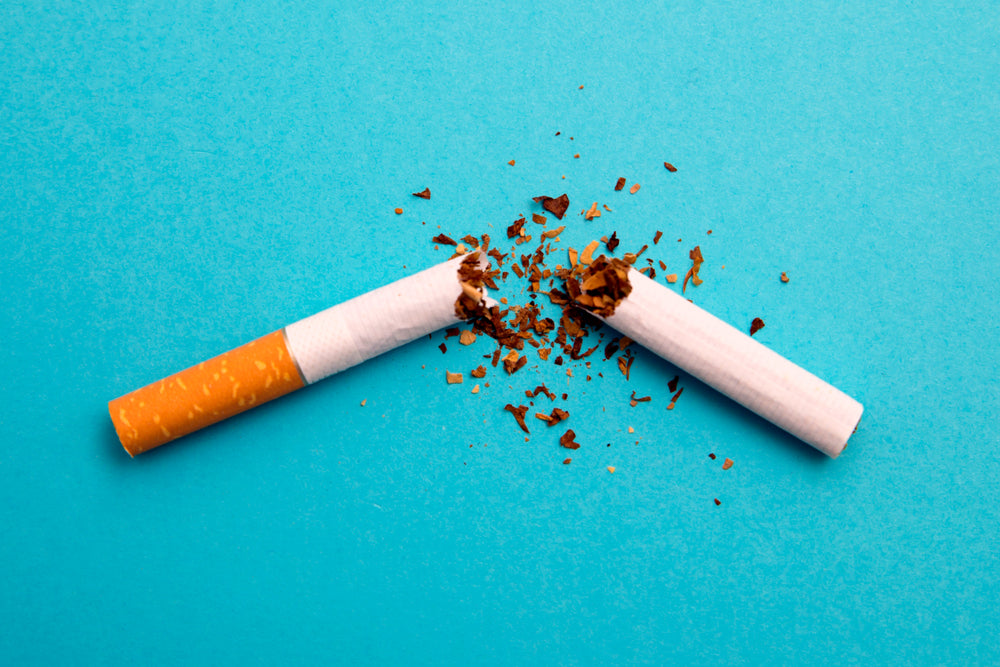Cigarettes are universally understood to be dangerous, but they're most often associated with respiratory diseases. Discussed less often is their hazardous impact on heart health. For this American Heart Month, read on to learn how cigarettes damages your heart and how quitting can reduce and even reverse this damage over time!

How Cigarette Smoking Affects Heart Health
Smoking is highly detrimental to not only your heart, but also your blood vessels. When you smoke, your heart rate and blood pressure go up immediately, if temporarily. Over time, this damages the blood vessels, increasing your risk of a cardiovascular disease called atherosclerosis.
Atherosclerosis involves the build-up of plaque in your arteries, which hardens over time, narrowing the arteries and obstructing blood flow. When your blood flow is reduced, less oxygen travels to your organs, harming their essential functioning. And when the coronary arteries supplying blood to the heart become blocked, you can develop ischemic heart disease, putting you at risk of angina (chest pain), heart attack, arrhythmia, and heart failure.

The Benefits of Quitting
Quitting smoking can seem trivial after years of damage from cigarettes, but no matter your age or how long you've smoked, it can help you. The longer you go without smoking, the stronger the benefits, for your heart and the rest of your body:
-
20 Minutes After Quitting: Your heart rate and blood pressure decrease.
-
12 Hours After Quitting: The carbon monoxide level in your blood returns to normal.
-
2 Weeks to 3 Months After Quitting: Lung function and circulation both improve.
-
1 to 9 Months After Quitting: A decrease in coughing and shortness of breath. The cilia in your lungs begin to function as normal, reducing the risk of infection and improving lung health.
-
1 Year After Quitting: Your heart attack risk drops, and your risk of coronary heart disease decreases to half of a current smoker's.
-
5 Years After Quitting: Your risks of certain cancers reduce by half, including those of the mouth, throat, esophagus, and bladder. Your cervical cancer risk becomes that of a non-smoker. Your stroke risk can reduce to that of a non-smoker.
-
10 Years After Quitting: Your risk of lung cancer becomes half that of a current smoker. Your risk of cancer of the larynx and pancreas decrease.
-
15 Years After Quitting: Your risk of coronary heart disease reduces to that of a non-smoker's.

Quitting Smoking
Everyone acknowledges that quitting is difficult. But there's a crucial thing you can do to help yourself before you even smoke your last cigarette: Make a Plan! Preparing for quitting can help give you guidance, and give the process a shape and structure so it seems less daunting. Here are some tips on how to do that:
-
Establish a day to officially quit, and let your friends and family know. Emotional support is crucial.
-
Set goals: what timeframe for reducing or eliminating cigarettes works for you? What does success mean for you specifically, and by how many months?
-
Ask your friends and family to avoid smoking around you.
-
Get rid of all cigarettes and paraphernalia, such as lighters and ashtrays.
-
Stock up on oral substitutes to transfer your habit: sugarless gum, carrot sticks, toothpicks, coffee stirrers.
-
Join a group support program such as Nicotine Anonymous.
-
Research different types of counseling or therapies that may help.
-
Consult your doctor about prescriptions that may help you reduce nicotine dependence, as well as alternative forms of nicotine to help you gradually lessen your intake.
Please consult your doctor or other qualified medical professional before stopping or starting any medications, supplements, or health regimens.




Leave a comment